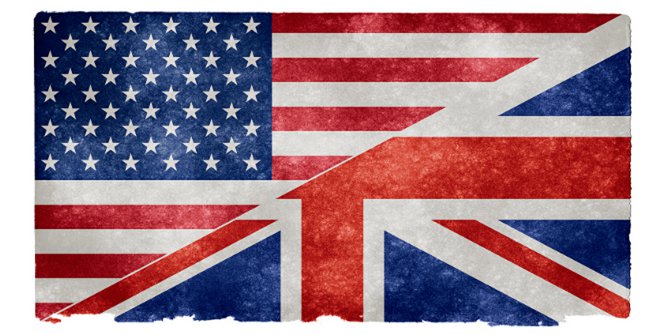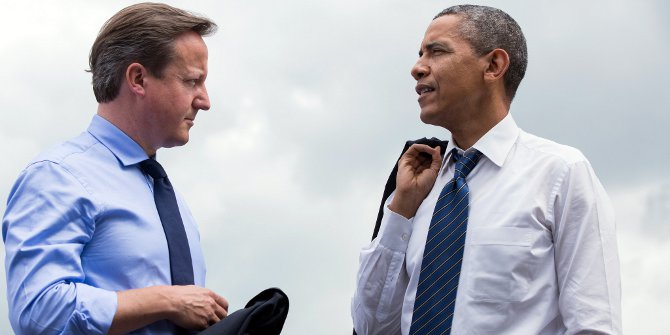 In an interview this week, President Obama raised concerns about the potential of an EU-exit for the UK. Tim Oliver argues that Obama was right to raise these concerns, as Brexit is not simply a matter for domestic UK politics. It would also affect many of the UK’s closest allies including the USA.
In an interview this week, President Obama raised concerns about the potential of an EU-exit for the UK. Tim Oliver argues that Obama was right to raise these concerns, as Brexit is not simply a matter for domestic UK politics. It would also affect many of the UK’s closest allies including the USA.
In a recent interview with Jon Sopel of BBC News, President Barack Obama spoke about a potential British exit from the EU.
I will say this, that having the United Kingdom in the European Union gives us much greater confidence about the strength of the transatlantic union and is part of the cornerstone of institutions built after World War II that has made the world safer and more prosperous.
And we want to make sure that United Kingdom continues to have that influence. Because we believe that the values that we share are the right ones, not just for ourselves, but for Europe as a whole and the world as a whole.
Obama’s comments immediately drew the ire of Eurosceptics. Conservative MEP Dan Hannan tweeted ‘I accept that there may be some arguments for staying in the EU. Humouring Barack Obama is not one of them.’ Various UK Independence Party (UKIP) politicians and representatives weighed in. A party spokesman told the Express: ‘So Obama’s method is, ladle on the flattery, then try and get them to do something that suits him, rather than us. Not much of a friend.’ UKIP MEP Patrick Flynn tweeted: ‘Barack Obama unwise to pressurise Britain to stay in the EU for America’s convenience. We need to look to our own national interest first.’ Delve into the comments section of many articles on the topic and you find a barrage of often puerile abuse directed at Obama and the USA.
Obama has faced similar criticism in the past from some on the political right in the US. In June 2015 Obama stated that, ‘we are very much looking forward to the United Kingdom staying a part of the European Union’. Nile Gardiner, head of the Margaret Thatcher Center for Freedom at the Tea Party leaning Heritage Foundation think tank, accused Obama of leading ‘an extraordinary interference in Britain’s internal affairs by the United States government.’
There is a degree of hypocrisy here given some of those on the US political right who criticise Obama for saying such things think nothing of calling on him and the US to intervene militarily in foreign states. Nor do they hold back from calling for the US government to push the UK and other European allies to spend more on defence. In his BBC interview Obama was asked if the US had put pressure on the UK to spend 2 percent of GDP on defence. Obama admitted there had been an, ‘honest conversation’.
The general criticism made of Obama is that the matter of UK membership of the EU is none of the US’s business, or that of any other country or world leader. But a Brexit (like UK defence spending) is the US’s business. Voting to leave the EU would be a decision that could transform the UK, change the EU, reshape the transatlantic relationship and have clear economic, political and security implications for the US. These are not issues any President of the United States – Republican or Democrat – can stay silent on.
The USA is not the only state to voice concerns and make clear its position. The Irish Republic has repeatedly warned that the economic and security implications for it and Northern Ireland (where a Brexit could destabilise the peace process) mean that it strongly opposes a Brexit.

Other EU countries have not been so direct in public. Some are weary of the debate, seeing the issue as a distraction from the bigger problems facing the EU. Some worry that admitting they do not want to see Britain leave would strengthen UK Prime Minister David Cameron’s hand in his attempt to renegotiate Britain’s membership. But as a leak to the Guardian newspaper showed, even David Cameron does not want to see a Brexit.
Last year the German Council on Foreign Relations published a report (edited by myself and Almut Möller) reviewing how 26 countries from around Europe and the world view the possibility of a Brexit. The report was clear that other EU members, the USA, and UK allies such as Canada, Australia, New Zealand, Japan, Singapore and Norway are aware that a Brexit would change the EU, European geopolitics and transatlantic relations.
These countries worry a Brexit would not be good for them or the UK. But this is not simply about narrow national interests. Many worry about the collective damage to the relationships that bind many of these countries together.
A Brexit could change the EU. It would lose one of its largest, most outward looking and important member states. The EU today reflects a list of British successes, such as the Single Market or enlargement to Central and Eastern Europe. A Brexit could shift the political balance in the EU, running the risk of making it less open, less interested in global issues, less Atlanticist, and perhaps weaken it in such a way that it begins to unravel.
For the US, the transatlantic relationship is not just about the US-UK ‘special relationship’. Europe and North America are the most integrated regions of the world in economics, politics and security. The US is not going to give up on the EU if Britain leaves. The US government wants the US-EU Transatlantic Trade and Investment Partnership to work, not a smaller free trade deal with just the UK. A Brexit would mean Britain risks becoming an awkward inbetweener, beholden more than ever before to the ebb and flow of the wider transatlantic relationship.
Then there is the UK itself. The possibility of Brexit leading to economic damage to the UK, of instability in Northern Ireland and the opening of the Pandora’s Box of Scottish independence means Britain’s allies and friends are understandably concerned about where a Brexit would take one of their closest allies.
It’s important to appreciate that other states will have a say over the future of the UK. If Britain votes to leave the EU then it cannot simply demand a new relationship with the EU of its own choosing. That new relationship will be one the other EU member states (and potentially their parliaments and voters) and the European Parliament will have to agree to. Ideas by some on the right of UK politics that the UK could join something like NAFTA as a substitute overlook how few in the USA take such an idea seriously, let alone opinion in Mexico or Canada.
Like many states, Britain is wrestling with the challenges and opportunities of economic, political and security interdependencies as a result of Europeanisation or globalisation. It is inevitable that a key part of the debate leading up to the EU referendum will be hearing the opinions of Britain’s closest allies and friends. Without it, Britain’s referendum debate will be oblivious to the extent to which Britain’s place in the world depends on the behaviour and outlook of others.
Please read our comments policy before commenting.
Note: This article gives the views of the author, and not the position of USApp– American Politics and Policy, nor of the London School of Economics.
Shortened URL for this post: http://bit.ly/1g9fr5L
_________________________________
 Tim Oliver – LSE IDEAS
Tim Oliver – LSE IDEAS
Tim Oliver is a Dahrendorf Postdoctoral Fellow on Europe-North American relations at LSE IDEAS and a Non-Resident Fellow at the SAIS Center for Transatlantic Relations. He has also worked at RAND, the Stiftung Wissenschaft und Politik, the Royal Military Academy Sandhurst, LSE, UCL, the House of Lords and the European Parliament.






1 Comments